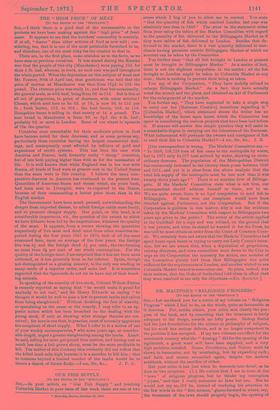OUR FISH SUPPLY.
[To THB EDITOR OF TSR " SPECTATOR:]
SIR,—In your article on "Our Fish Supply" and touching Columbia Market in your issue of last week there are one or two • 'Saturday Review, October 27, 1866.
errors which I beg of you to allow me to correct. You state "that the quantity of fish which reached London last year was absolutely less than in 1848." The error in the statement arises from your using the tables of the Market Committee with regard to the quantity of fish delivered to the Billingsgate Market as if they were tables of fish delivered to London. Besides that de- livered to the market, there is a vast quantity delivered to mer- chants having premises outside Billingsgate Market of which no account can be taken by the Committee.
You further state "that all fish brought to London at present must be brought to Billingsgate Market." As a matter of fact, there is not the slightest compulsion in the matter ; all the fish brought to London misitt be taken to Columbia Market at any time ; there is nothing to prevent their being so taken.
You say of the Corporation, "They have stolidly refused to enlarge Billingsgate Market." As a fact, they have actually voted the money and the plans, and obtained an Act of Parliament for the enlargement of the market.
You further say, "They have neglected to take a single step to carry out her [Baroness Coutta's] intentions regarding it"
[Columbia Market], which statement shows the writer has no knowledge of the hours upon hours which the Committee has spent in considering the various projects that have been laid before it. If anyone will answer this simple question they will assist in a remarkable degree in carrying out the intentions of the Baroness What inducement will persuade the owners and consignees of fish to send their fish to Columbia Market P—I am, Sir, &a., I. B.
[Our correspondent is wrong. The Markers' Committee say:— " In 1848, 108,739 tons of fish came to the metropolis by water, but in 1871 only 44,077 tons arrived by water, showing an extra- ordinary decrease. The population of the Metropolitan District has enormously increased in the twenty-three years between 1848 and 1871, and yet it is clear from the above analysis that the total fish supply of the metropolis must be less now than it was twenty-three years ago?" There is no mention here of Billings- gate. If the Markets' Committee state what is not true, our correspondent should address himself to them, not to us. We are quite aware there is no legal compulsion to send fish to Billingsgate. If there was, our complaint would have been directed against Parliament, not the Corporation. But if the Corporation is guiltless in this matter, why is not the evidence taken by the Markets' Committee with respect to Billingsgate two- years ago given to the public? The writer of the article applied at the Guildhall for a copy and was refused, on the ground that it was private, and when he stated he wanted it for the Press, he was told he must obtain an order from the Court of Common Coun- cil. We certainly were not aware that the Markets' Committee had spent hours upon hours in trying to carry out Lady Coutts's inten- tion, but we are aware that, when a deputation of proprietors, railway directors, and town councillors went down to the City to- urge on the Corporation the necessity for action, one member of the Committee plainly told them that Billingsgate was quite sufficient for the requirements of London, and another wished to see Columbia Market turned to some other use. So plain, indeed, was their animus, that the Duke of Sutherland told them in effect that they were resolved to see only the objections.—En. ■*eclator.]


































 Previous page
Previous page